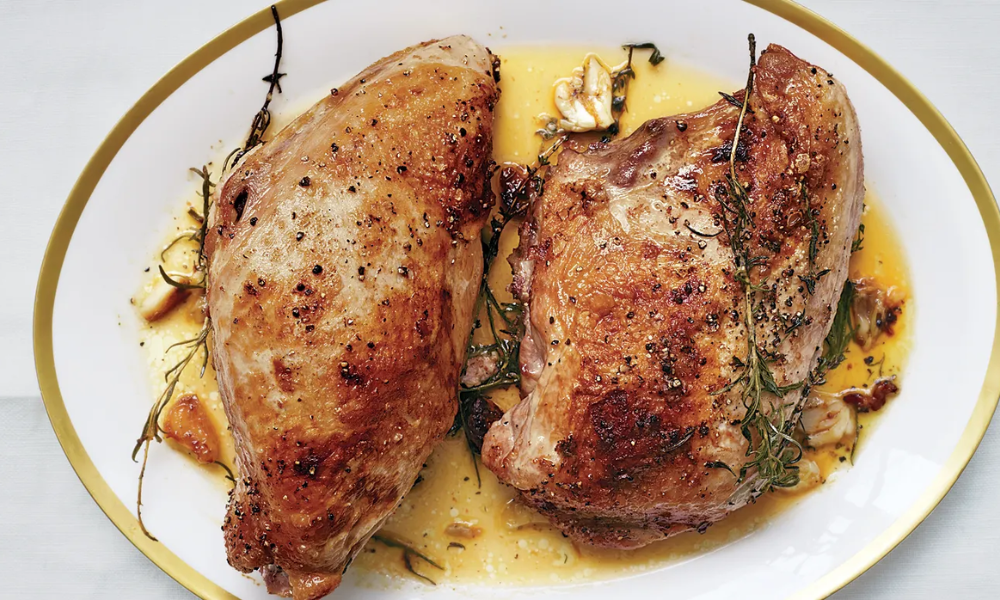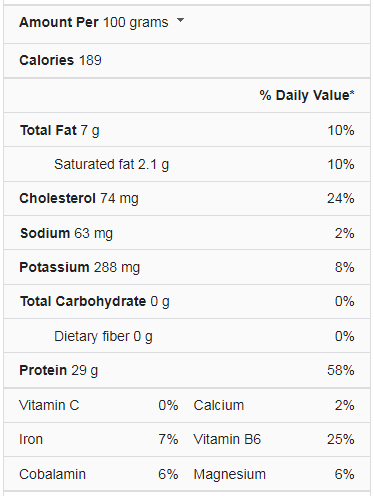Almost any type of meat can be marinated to create a tasty dish. Although lean meats like chicken or turkey breast are excellent for nutritious meals, they typically lack the flavor of meat cuts with higher fat. A nice marinade makes all the difference in this situation. A prime example is this seasoned turkey breast! The turkey goes from a little monotonous to utterly delicious, thanks to the simple marinade. You don’t need to add sauces or toppings because the marinade’s flavors are potent enough. This is advantageous if you don’t want to make your dish taste better by adding a lot of calories or sodium.
Whether it’s a smoked turkey, a deep-fried turkey, or this marinated turkey breast, there are many ways to cook a turkey. A certain approach to consistently producing a lovely and delicious chicken! Leave the turkey breast in the marinade until you’re ready to cook it. The turkey breast should be taken out of the marinade, cooked as desired, sliced, and served.
Turkey Breast Nutrition Facts
Turkey Breast
The meat from the turkey’s chest is known as a breast, and the only white meat on the bird is this substantial piece. As a result, it costs a bit more per pound than a whole turkey but is also simpler to handle and store. Turkey breast can be pan-seared, chopped into tiny cutlets, grilled, smoked, or baked. It can also be made in a slow cooker or electric pressure cooker. An appealing holiday entree can be made from a boneless, skin-on breast that has been butterflied, stuffed with ingredients like herbs, mushrooms, and breadcrumbs, rolled up, and tied.
Taste
Compared to chicken breast, turkey breast has a deeper flavor, a soft, juicy texture, a mild, savory flavor, and a hint of sweetness. Along with traditional holiday accompaniments like turkey gravy, cranberry sauce, and stuffing prepared with components like celery and sage, flavorings like spice rubs and herb butter are popular with this type of meat. Mayonnaise and mustard are common sandwich toppings when roasted, smoked, and sliced.
What is Marination?
Before cooking, foods, especially meats, are soaked in a liquid solution known as a marinade. By starting the breakdown process of cooking, a marinade gives foods flavor and increases their tenderness. This reaction can be brought on by enzymatic elements like pineapple, papaya, guava, ginger, or acidic ingredients like vinegar, wine, or fruit juice. As a result, the meat retains its moisture during grilling and doesn’t dry out as rapidly. The breakdown also enables liquids and seasonings to permeate the meat.
Due to the high, intense heat that grills produce, marinades are particularly significant and helpful while grilling. These may cause dangerous chemicals to develop on the surface when cooking, and an acidic marinade decreases the production of these compounds.
Meat more likely to dry out on the grill, such as chicken breasts, turkey breast and pork loin, will benefit from a marinade to keep the moisture in. Italian dressing is a nice illustration of a simple marinade. Marinades are fairly simple to make at home or get from a store.
Types of Food to Marinate
Here are different kinds of food to marinate:
- Seafood: Fish and shellfish should marinate for only 30 minutes to an hour; any longer and the flesh might start to “cook” in the acid and yield mushy results.
- Chicken: A chicken marinade is great for the whole or individual parts. If you’re planning to cook a whole chicken, consider using spatchcocking to flatten the carcass. Furthermore, cutting a chicken into smaller pieces or removing the skin will help absorb the marinade. Two hours of marinating are plenty of time for the meat to soak up the flavor, but poultry can marinate for up to two days in the refrigerator. Very acidic marinades can toughen the meat over time, so read the recipe and follow the recommendations.
- Beef and Pork: A steak marinade is ideal for tougher cuts like flank, skirt, sirloin, round, and hanger. It also wonders for pork tenderloin and pork loin if the loin is cubed into smaller pieces. These cuts can marinate for up to 24 hours. Flat cuts of meat benefit the most from tenderizing marinades. Please avoid better-quality steaks, like porterhouse or ribeye, because marinating can ruin them.
- Tofu: Unlike meat, tofu can absorb flavor and be marinated for as long as 24 hours.
- Vegetables: Avoid marinating soft vegetables longer than 10 minutes; they will throw off the water and become soggy before hitting the grill. Frozen vegetables like potatoes, carrots, squash, etc., can marinate for up to 30 minutes.
How to Marinate Turkey Breast?
Here is one of the best-marinated turkey breast recipes:
Ingredients
- One turkey breast (bone-in or boneless, skin-on, about 2 – 2 1/2 lbs)
- Three rosemary twigs for garnish
For the Marinade
- 1/4 cup olive oil
- 2 Tbsp sesame oil
- 1/2 cup low sodium soy sauce
- 2 Tbsp Worcestershire sauce
- Juice from 1 lemon
- 1/2 cup honey or maple syrup
- Eight cloves of garlic minced
- Three rosemary twigs whole
- 1 tsp freshly ground black pepper
- 4 tsp kosher salt plus more to taste
Instructions
-
Mix the ingredients in a large bowl or a plastic Ziplock bag to prepare the marinade. Add the turkey breast and ensure that every part is covered with the marinade. If using a Ziplock bag, expel as much air as possible before sealing it. Marinate in a fridge for 12-24 hours. If marinating is not an option, roast the breast immediately and serve with those delicious pan juices – it will still be awesome.
-
Preheat the oven to 325F.
-
Place the turkey breast into a deep baking dish and pour in the marinade. It’s best to use a baking dish that is not too big; otherwise, too much liquid will evaporate. Bake uncovered on a middle rack for about 1 to 1 1/2 hours, depending on size, until the internal temperature of the meat in the thickest part reaches 160F – the temperature will rise to 165F during resting (see Notes). Baste the top and the sides of the breast with pan juices about every 20 minutes – this will prevent the top from drying out and help with browning.
-
If the end of baking, the skin did not brown enough, turn on the broiler on high for 2-3 minutes. Do this before the internal temperature reaches 160F. I normally do it at about 150F internal. Monitor the broiling process very closely as the skin can go from a nice deep-golden brown to charred pretty quickly.
-
Remove the turkey breast from the oven and let it rest for 5 minutes before carving and serving. I find that it’s best to transfer the breast to a serving platter immediately upon removing it from the oven. If left to rest in the hot baking dish, the internal temperature will rise too much, and meat will lose more moisture.
-
Carve the meat, place it on a serving platter and garnish it with fresh rosemary twigs. Serve with the pan juices (don’t forget to discard the cooked rosemary twigs); they are delicious.
How Long should you Marinate?
Different cuts of meat should be marinated for varying lengths of time. Excessive time in an acidic marinade for chicken, fish and seafood can denature proteins and result in a harder texture. A milder acidic marinade for a shorter period is preferable for these foods. Meat can get mushy if an enzyme marinade is left on for too long.
Only a brief marinating period of 15 to 30 minutes should be used for fish and seafood. For chicken parts, two hours is generally long enough to avoid the possibility of toughening. One to twelve hours can be used to marinate beef and pig. While lighter veggies only require 30 minutes of marinating, dense root vegetables can take up to two hours. The strength of the marinade and the specific directions for the type of meat or fish you are using should be followed.
Where to Buy Turkey Breasts?
Fresh turkey breast is available in most butcher shops and the chilled meat area of well-stocked supermarkets. You can get turkey breasts with or without skin, with or without bones, and as split or entire breasts. Preservatives, injections, and additions can negatively alter flavor and texture, so stay away from products that include them. Whole, bone-in turkey breasts normally weigh between four and twelve pounds each and are sold by the pound. It’s best to call the grocer in advance to confirm availability because fresh cuts of turkey are occasionally thought of as seasonal cuisine in the United States.
Storage Tip
Before cooking, keep uncooked turkey breast in its original packaging in a refrigerator at 40 degrees Fahrenheit or below for up to two days. Please put it in a tray or dish in the fridge to collect any leaks. For up to four days, keep cooked turkey breast in the refrigerator in a sealed container. For up to a year, frozen turkey breast can be kept in its original packaging in the freezer. For every four to five pounds of turkey breast, allow one day for thawing in the refrigerator.
Conclusion
A marinade touches raw meat, fish, and seafood, picking up any microorganisms that may be present there. The marinating object must be kept in the refrigerator and should not marinate at room temperature.
The marinade gives the dish flavor and moisture because turkey breasts are naturally lean. The unexpected ingredients in the marinade work together to give the turkey a flavor profile that is evenly balanced between sweet, salty, and acidic. It almost tastes like a lighter variety of teriyaki sauce. Additionally, this marinade tastes great on chicken breasts.


